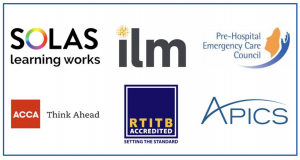Quality Assurance Handbook
The Leading Health & Safety and Business Training Provider in the West of Ireland.

Our QA Manual
Please select the section of the Quality Assurance Manual you wish to view.
Section 2 - Governance & Structures for WMC
Section 3 - Documented Approach to QA
Section 4 - Programmes of Education & Training
Section 5 - Staff Recruitment, Management
Section 6 - Teaching and Learning
Section 7 - Assessment of Learners
Section 8 - Support for Learners
Section 9 - Information & Data Management
Section 10 - Public Information & Communication
11.1 Other Parties Involved in Education and Training Policy
11.1.1 Purpose
Western Management Centre (WMC) engages with external, reputable bodies for the purposes of external peer review and programme delivery. Where engagement with third parties occurs, these relationships are subject to internal and external partner quality assurance (QA) procedures.
11.1.2 Policy Statement
This policy outlines WMC’s commitment to engaging with external partners for differing aspects of programme and service delivery and to incorporate external systems of peer review. The ongoing quality assurance management of external relationships ensures full adherence to agreed service-level agreements (SLAs) and mitigates reputational risk to WMC, the education and training sector and/or national qualifications systems associated with WMC, and Centre stakeholders.
11.1.3 Responsibility of
This policy is the responsibility of the Managing Director and Registrar.
11.1.4 Processes and Procedures
Peer Relationships with the Broader Education and Training Community
WMC is a provider of education and training programmes leading to recognised qualifications and awards made on the National Framework of Qualifications (NFQ). Additionally, WMC deliver a number of programmes and awards which are accredited and validated by third-party institutions or awarding bodies.
Where relationships are in place between WMC and third-party institutions, these relationships are subject to appropriate internal and external QA procedures. In addition, accreditation to deliver these programmes is published on the WMC website and usually on the website of the third-party institution. The development, approval, and ongoing QA management of programmes operated in collaboration with other organisations mitigates the reputational risk to WMC, the education and training sector, and/or national qualifications systems associated with WMC and Centre stakeholders.
Where relationships are established between WMC and external parties, the Registrar is responsible for ensuring all relationships adhere to WMC QA standards.
In addition to delivering QQI accredited programmes, WMC offers programmes validated and/or accredited by the awarding bodies included in Figure 14.

Figure 14 – Awarding Bodies
Peer and External Stakeholder Relationships
WMC maintains formal links with key industry stakeholders and engages with the education and training community through activities including attendance at conferences and memberships of peer groups. Stakeholder links are maintained with organisations outlined in Table 2.
|
Organisation |
Description |
|
Galway Chamber of Commerce |
Galway Chamber is the premier business organisation in Galway City and its hinterland. Galway Chamber currently represent approximately 500 companies. It is a privately constituted organisation that works for the interests of businesses, and for the economic development of the City and Region. |
|
Western Development Commission (WDC) |
The Western Development Commission (WDC) is a statutory body that was set up to promote both social and economic development in the Western Region. WDC collaborates with all sectors (public, private and voluntary) to find ways around organisational boundaries. The organisation’s strong ethos of sharing intellectual and other resources means it is well placed to help achieve common good within the West. |
|
Skillnet Ireland |
Skillnet Ireland is a business support agency of the Government of Ireland. The organisation’s mandate is to advance the competitiveness, productivity and innovation of businesses operating in Ireland through enterprise-led workforce development. The primary objective of Skillnet Ireland is to increase participation in enterprise training by businesses to keep businesses competitive in both a domestic and international context and enhance the career mobility of the workforce. |
|
Organisation |
Description |
|
Irish Business and Employers Federation (IBEC) |
The Irish Business and Employers Federation (IBEC) campaigns to increase investment in education and skills development and to support greater engagement between enterprise and education. Working together, Ireland’s education and training system and Irish business can create a culture for lifelong learning, place a greater focus on employability skills and develop the skills and attributes required in the 21st century. |
|
West Regional Skills Forum |
The West Regional Skills Forum supports and facilitates communication and engagement between enterprise and education providers in the identification, development and delivery of skills required for Galway, Mayo and Roscommon. Increased communication and engagement ensures the skills needs of business are met to support job creation, sustainability of business and their talent pipelines. |
Table 2: Links to Stakeholder Organisations
Expert Panellists, Authenticators
The WMC governance structure recognises the importance of working with external members who are experts in industry and academic matters. The recruitment of external panel members serves to provide the WMC governance structure with independent members who contribute positively to the development of the Centre, its mission and values.
WMC operates clear standards and procedures for the recruitment and engagement of external, independent, national experts and expert panel members.
WMC will appoint External Authenticators through the Centre’s quality assured processes (for more information, see Section 7.6, External Authentication Policy). In addition, WMC may source suitably qualified External Authenticators from the QQI External Authenticator Panel.
Where external expertise for panel membership and external authentication are selected and engaged, all new appointees/candidates will be deemed to be independent experts and members of the broader community of education and training practice. Persons who are appointed to the roles of expert panellists must have experience to demonstrate that they possess the requisite knowledge, skills, and competence required to fulfil the position.
Competencies of Expert Panellists
Potential candidates may be drawn from the further or higher education communities or from other communities of practice (provided candidates have the necessary competencies or acquire them prior to engagement). Competency may be demonstrated through a number of pathways. These include (but are not limited to):
-
Practical understanding of the context for the Centre’s programmes and the Further Education and Training (FET) sector
-
Professional standing and reputation
-
Practical understanding of QQI’s awards standards at the relevant NFQ level and in the relevant fields of learning
-
Ability to make national and international comparisons with similar kinds of programmes at approximately the same NFQ level (or equivalent) in similar fields of learning
-
Understanding of corporate governance and/or financial management and/or internal audit
-
Knowledge of national and international education and training systems with specific knowledge of programmes and awards similar to those provided by WMC
-
Possible expertise in quality assurance, programme accreditation/review and other issues relating to teaching and learning approaches, assessment, and learner supports
-
Knowledge of other business/industrial/social/educational environment relevant to the field of learning
-
Research publications and citations as relevant to the particular panel being convened
Independence
Expert Panellists and External Authenticators must act with objectivity and strict impartiality. This is a core component in maintaining transparency with all stakeholders and ensuring stakeholder confidence in programmes and services offered by WMC and QQI.
WMC does not appoint individuals where there is any possibility (real or apparent) of conflict of interests between potential candidates and WMC.
All prospective Expert Panellists and Authenticators have the primary responsibility for disclosing interests that represent conflict of interest or lead to conflict of interest. Potential candidates are requested to declare in writing any relevant interests and potential conflicts of interest prior to engagement.
Where any potential conflict of interest is discovered after the engagement of an Expert Panellist or External Authenticator, these candidates must disclose this in writing, in consultation with the Registrar.
Where a conflict of interest is discovered, the Expert Panellist or External Authenticator will take no further part in the panel or evaluation process. The Academic Council may advise on the eligibility of the expert panellist or external authenticator.
Independence and expertise are assessed according to best practice by the Registrar and a designated nominee of the Academic Council. At all times, cognisance will be taken of previous business, professional and academic relationships, and experience.
Stay Up To Date
Join Our Mailing List Today - Get The Latest Industry Insights & First Look At The Newest Upcoming Training Courses.
GET IN TOUCH
Our Training Team are on hand to assist you with course enquiries, bookings, or scheduling development opportunities.
CALL US
EMAIL US
VISIT US
Galway Business Park, Dangan,
Galway, Ireland.